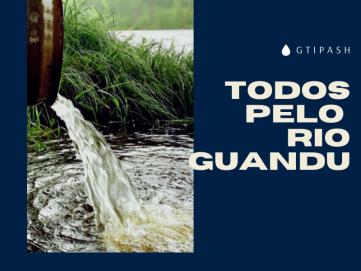The Secretary of State for the Environment and Sustainability of Rio de Janeiro – SEAS/RJ, Thiago Pampolha, created in January this year the Permanent Interinstitutional Technical Group for Monitoring Water Security in Hydrographic Region II – Guandu (GTIPASH Guandu). The group’s objective is to monitor, discuss and propose preventive, mitigating and emergency actions related to water quality, public supply and multiple uses of water in the State’s Hydrographic Region II, which covers the basins of the Guandu, Guarda and Guandu-mirim rivers , responsible for supplying about nine million people in the Metropolitan Region of Rio de Janeiro.
The articulation brings together representatives of the Specialized Action Group on the Environment of the Public Ministry of Rio de Janeiro (GAEMA/MPRJ), State Secretariat for Environment and Sustainability (SEAS), State Water and Sewage Company of Rio de Janeiro (CEDAEA), Guandu-RJ Committee, State Institute for the Environment (INEA), Regulatory Agency for Energy and Basic Sanitation of the State of Rio de Janeiro (AGENERSA), Osvaldo Cruz Foundation (Fiocruz), State University of Rio de Janeiro (UERJ) and the Institute Metropolis River (IRM). The mission is to analyze situations involving the public supply of the metropolitan region, proposing solutions, and monitoring to anticipate any problems in order to meet the qualitative and quantitative requirements for water in the basin. “The objective is clear and simple: to involve actors who work in the management of the Guandu basin, as well as specialists and the Public Ministry, in a group that will work on the problems in search of practical and effective solutions, with a focus on guaranteeing public supply of quality, and also the multiple uses of water”, explained Paulo de Tarso Pimenta, general director of the Guandu-RJ Committee.
The solutions and proposals coming from GTIPASH Guandu must be adopted by the members of the group according to their competences and responsibilities. “The exchange of information will be faster and more efficient, as well as the proposition and execution of solutions. We will ensure the effectiveness and effectiveness of actions. The idea is to set up a matrix of responsibilities that will make clear how to act in the management of the water, especially in cases that may pose risks to the quality of supply,” he explained.
Municipalities, as well as other institutions and representations in the basin, will also be invited to participate, in a timely manner, to contribute with the solutions.
The first meeting of GTIPASH will take place this Friday (5) at 15:00. The organizations will analyze technical opinions and start building a matrix of projects and responsibilities to point out integrated actions for water security and preservation of water quality in Guandu.
One of the first actions that may involve the group is the project Observatório de Basin, by the Guandu-RJ Committee. The project, which is already underway, will scale and establish a monitoring network in the Guandu River basin, from where the Guandu Treatment Station (ETA-Guandu/CEDAE) collects 43,000 liters of water per second. supply the municipalities of Nilópolis, Nova Iguaçu, Duque de Caxias, Belford Roxo, São João de Meriti, Itaguaí, Queimados and Rio de Janeiro. Through this network, the authorities will be able to obtain information about the quality of the water at different points, including the abstraction, which will leverage actions to improve water quality. The network will issue alerts, for example, when there is any type of change that requires the capture to be interrupted so that measures can be taken. Monitoring will also be quantitative, with warnings of shortages and floods, for example, with an eventual danger of flooding. “We hired, through a call notice, last year, the company that will work on the dimensioning. After this study, we will establish the network and involve all actors in qualitative and quantitative water monitoring. The information will support decisions and make the actions more accurate”, said Paulo de Tarso.
COMMUNICATION GUANDU COMMITTEE
Telephone: (21) 3787 3729
E mail: comunicacao.guandu@agevap.org.br

